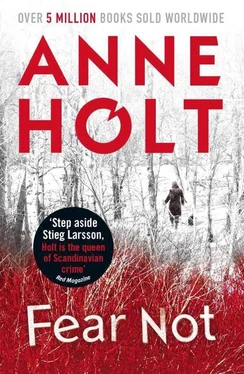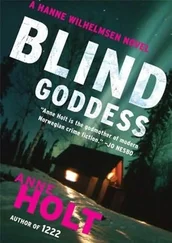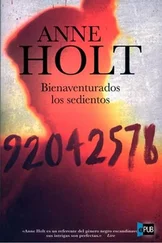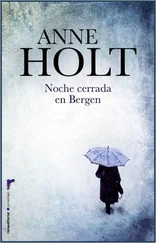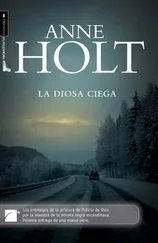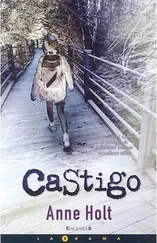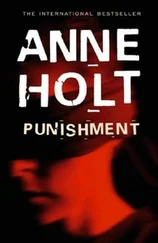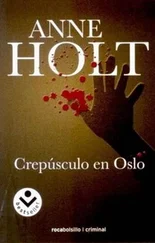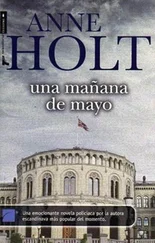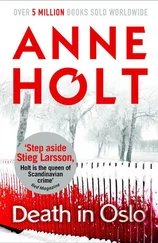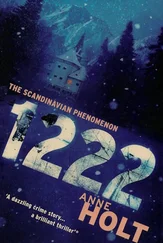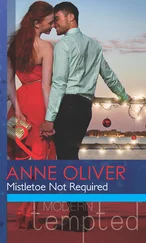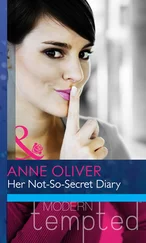Johanne followed her without saying any more. Only when they were in the living room did she spread her hands encouragingly and confess: ‘We’re going to have a duvet day today, Kristiane! Just the two of us! Would you like some hot chocolate with whipped cream?’
‘Dam-di-rum-ram,’ said Kristiane as she slowly began rocking from side to side on the sofa.
Johanne went over to her daughter and sat down beside her. She pulled Kristiane’s sweater and vest out of the waistband of her trousers and allowed her fingers to dance gently over her daughter’s slender young back. Kristiane smiled and lay down across her knee. They sat there for several minutes until Kristiane began to sing a folk song.
‘Bind deg ein blomekrans, kom so til leik og dans, fela ho let no så vakkert i lund.’
‘That’s a lovely song,’ whispered Johanne.
‘Sit ikkje stur og tung, syn at du óg er ung…’
Kristiane stopped singing.
‘A lovely spring song,’ Johanne said. ‘A spring song in January. What a clever girl you are.’
‘If you sing about the spring, it will come.’
Kristiane’s laughter was as fragile as glass. Johanne ran her forefinger along the contours of her spine, all the way down from the nape of her neck.
‘That tickles,’ Kristiane smiled.
‘Do it again.’ ‘Do you remember Aunt Marie’s wedding?’
‘Of course. Where’s Sulamit, anyway?’
‘Sulamit was worn out, sweetheart. You remember that, don’t you?’
When she was one year old, Kristiane had been given a little red fire engine. She decided it was actually a cat, and called it Sulamit. It had been her faithful companion for more than eight years. The wheels had fallen off one by one, the colours had faded. The ladder on the roof was long gone. The eyes on the headlights were blind, and little Sulamit looked like neither a fire engine nor a cat when Adam reversed over it by mistake on the drive one day.
Kristiane had been inconsolable.
‘Sulamit was a wonderful cat,’ she said now. ‘Can I have another cat, Mum?’
‘But we’ve got Jack,’ said Johanne. ‘He’s not all that keen on cats, as you well know.’
‘I am the invisible child,’ said Kristiane.
Johanne’s fingers hovered like butterflies over the thin skin on her back.
‘Sometimes no one can see me.’
‘When?’ whispered Johanne.
‘Sulamit, sulamat, sulatullamit on the mat.’
‘Was it at Marie’s wedding that no one could see you?’
‘More. Tickle more, Mum.’
‘Did you see anyone? Even if they couldn’t see you?’
Johanne was desperately trying to remember what Kristiane had actually said that night at the hotel, when she herself had been terrified, furious and in no state to take in anything at all.
‘A lady was murdered there,’ said Kristiane, suddenly sitting up next to her mother. ‘Marianne Kleive. Nursery school teacher. Married to the noted award-winning documentary film-maker Synnøve Hessel! Women can marry each other in Norway. So can men.’
Her voice had suddenly reverted to a monotonous chant.
‘You read too many newspapers,’ smiled Johanne, putting her arm around her daughter and drawing her close.
‘Dearly loved, sadly missed.’
‘Have you started reading the death notices?’
‘A cross means the dead person was a Christian. A Star of David means the deceased was Jewish. What does the bird mean, Mum?’
At last Kristiane’s eyes met her mother’s gaze for a fleeting moment.
‘That you hope the dead person will rest in peace,’ Johanne whispered.
‘I want a bird in my death notice.’
‘You’re not going to die.’
‘I’m going to die one day.’
‘We’re all going to die one day.’
‘You too, Mum.’
‘Yes, me too. But not for a long time.’
‘You can’t know that.’
Silence. They were only whispering, sitting close together on the sofa, Johanne with her arm around the slender fourteen-year-old like a safety belt as the daylight poured in across the living-room floor, almost dazzling them. She could feel the budding breasts, the unavoidable signs that Kristiane, too, would become an adult, even if puberty had come late.
‘No,’ Johanne said eventually. ‘I can’t know that. But I don’t think it will happen for a long time. I’m healthy, Kristiane, and not so very old. Have you ever seen a dead person?’
‘You’ll die before me, Mum.’
‘I hope I do. No parent wants their child to die before them.’
‘Who will look after me when you die?’
Johanne had been asking herself that same question, over and over again, ever since Kristiane was just a few hours old, and Johanne was the only one who realized there was something wrong with her child.
‘You’ll be an adult by then, sweetheart. You’ll be able to look after yourself.’
‘I’ll never be able to look after myself. I’m not like other children. I go to a special school. I’m autistic.’
‘You’re not autistic, you’re…’
Johanne quickly sat up straight and placed her hand beneath Kristiane’s chin.
‘You’re not like other children. That’s quite true. You are just yourself. And I love you so much, just for being you. And you know what, Kristiane?’
Kristiane responded to her smile, her eyes focusing on Johanne.
‘I’m not exactly like other people either. Actually, I think we all feel that way. None of us feels exactly like other people. And there will always be someone to look after you. Ragnhild, for example. And Amund, too. He’s your nephew, after all!’
Kristiane’s laughter was brittle and as clear as a bell.
‘They’re younger than me!’
‘Yes, but by the time I die they’ll be grown up. And then they can look after you.’
‘I’ve seen a dead person. The soul weighs twenty-one grams. But you can’t see it leaving.’
Johanne said nothing. She still had her hand under Kristiane’s chin, but her daughter’s gaze was turned inward again, focused on a place no one else could reach, and her voice was expressionless and mechanical once more as she went on: ‘Marianne Kleive, forty-two years old, died 19 December 2008. Bishop Eva Karin Lysgaard, dearly loved, sadly missed, unexpectedly taken from us on Christmas Eve 2008. Funeral arrangements to be notified at a later date. The cross means she was a Christian.’
‘Stop,’ Johanne whispered, quickly drawing the girl close. ‘Stop now.’
It was exactly twelve o’clock, and a cloud drifted across the unforgiving January sun. A pleasant darkness filled the living room. Johanne closed her eyes as she held her daughter tightly, rocking her from side to side.
‘I am the invisible child,’ Kristiane whispered.
Perhaps he should never have had children.
The very thought made the acid in his stomach eat away at his duodenum. He drew up his knees and placed both hands on the spot where in his younger days he had been able to feel the end of his ribs and the beginning of his stomach. Now it was all just one soft mass, in spite of the fact that he was lying on his back: a flabby belly that was far too big, with a stabbing pain deep inside a layer of fat.
Marcus Koll’s entire life revolved around his son.
His work, his company, his extended family – it was all meaningless without little Marcus. When Rolf came into their lives they were already a twosome, but the three of them soon became a family, and Marcus would do anything to protect that family. But the boy remained the very hub of Marcus Koll’s family wheel.
Little Marcus quickly accepted Rolf, and the love was mutual. After a while Rolf had tentatively raised the question of whether he might adopt his stepson.
Читать дальше
